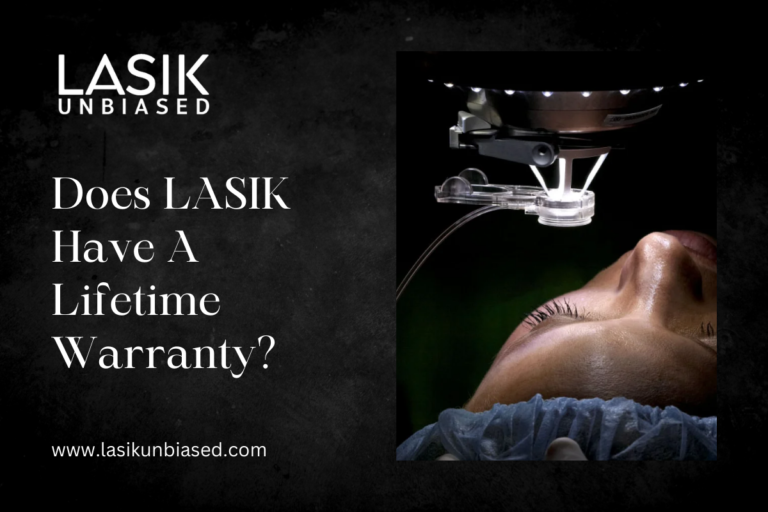LASIK surgery is a life-changing procedure that provides long-term vision correction, often eliminating the need for glasses or contact lenses. Many people considering LASIK wonder whether the results come with a lifetime warranty.
While some clinics offer lifetime guarantees, it is essential to understand what these warranties cover and how LASIK results hold up over time.
Does LASIK Provide Permanent Vision Correction?
LASIK permanently reshapes the cornea to correct refractive errors such as nearsightedness, farsightedness, and astigmatism. Most patients’ effects last a lifetime, and they do not require additional procedures. However, LASIK does not prevent natural age-related vision changes, such as presbyopia or cataracts, which may affect eyesight later in life.
What Does a LASIK Lifetime Warranty Cover?
Some LASIK providers offer a “lifetime guarantee” or “lifetime enhancement plan,” but the terms vary. These warranties typically cover enhancements or touch-up procedures if vision changes after surgery. However, they usually come with conditions such as:
- Maintaining regular eye check-ups with the provider
- Meeting specific vision change criteria for eligibility
- Excluding vision changes caused by aging, cataracts, or eye diseases
It is crucial to read the fine print of any warranty to understand what is covered and what is not.
Why Some Patients May Need LASIK Enhancements
While most LASIK patients achieve lasting vision correction, some may experience minor prescription changes. Enhancements are rare but may be necessary if:
- The initial procedure did not fully correct the refractive error
- The cornea heals unpredictably
- Vision naturally changes over the years due to presbyopia or other factors
A lifetime warranty can provide peace of mind by covering these adjustments only under specific conditions.
Does LASIK Prevent Future Eye Conditions?
LASIK corrects refractive errors but does not prevent common age-related eye conditions such as presbyopia, cataracts, or glaucoma. Patients who undergo LASIK may still need reading glasses in their 40s or cataract surgery later in life. These changes are natural and unrelated to LASIK, so most warranties do not cover them.
Alternatives to a Lifetime LASIK Warranty
Some clinics offer fixed-period enhancement guarantees, usually lasting one to five years, instead of a lifetime warranty. These guarantees ensure that necessary corrections are covered during the early post-surgery years when vision stabilization occurs. Other providers offer discounted enhancement procedures instead of free lifetime touch-ups.
Choosing the Right LASIK Provider
Rather than focusing solely on a lifetime warranty, choosing an experienced surgeon who uses advanced technology and provides thorough pre-operative evaluations is essential. A skilled surgeon ensures the best initial results, reducing the likelihood of needing future enhancements.
LASIK provides long-lasting vision correction, but no procedure can guarantee perfect eyesight for life. Some clinics offer lifetime warranties, but these come with conditions and do not cover age-related vision changes. Understanding the terms of any warranty and choosing a reputable LASIK provider ensures the best possible outcome and long-term satisfaction with vision correction.
Factors That Affect the Longevity of LASIK Results
While LASIK is designed to offer long-term vision correction, several factors influence how well the results last over time. The stability of a patient’s prescription before surgery, their overall eye health, and lifestyle choices all play a role in determining whether they need an enhancement procedure in the future.
Prescription Stability Before LASIK
LASIK candidates should have a stable prescription for at least one to two years before surgery for optimal and lasting results. Significant changes in vision before LASIK may indicate that the eyes are still adjusting, increasing the likelihood of needing enhancements later. Surgeons assess prescription stability during pre-operative evaluations to ensure patients are suitable candidates for LASIK.
Natural Aging and Presbyopia
One of the most common reasons patients experience vision changes after LASIK is presbyopia, an age-related condition that affects near vision. This typically begins in the early to mid-40s when the eye’s natural lens loses flexibility, making it harder to focus on close-up objects. LASIK does not prevent presbyopia, so many patients who had LASIK in their younger years may still need reading glasses later in life.
Monovision LASIK may be an option for individuals who want to reduce their dependence on reading glasses. This technique corrects one eye for distance vision and the other for near vision, providing a balance that helps with presbyopia. Some LASIK providers offer monovision enhancements later in life, but these adjustments are usually not covered under standard lifetime warranties.
Cataracts and Other Eye Diseases
Cataracts, which develop as part of the natural aging process, can affect vision regardless of whether someone has had LASIK. When cataracts form, the eye’s natural lens becomes cloudy, leading to blurry vision, glare, and difficulty seeing in low light. Since LASIK only reshapes the cornea and does not affect the lens, cataract surgery is still required when cataracts develop.
Other eye conditions, such as glaucoma or retinal diseases, can impact vision after LASIK. These conditions are unrelated to the procedure but can change vision over time. LASIK warranties generally do not cover vision loss caused by such medical conditions, as they are part of the natural aging process.
The Importance of Post-LASIK Eye Care
Taking care of eye health after LASIK contributes to the longevity of vision correction. Routine eye exams help detect changes early, allowing for timely intervention.
Protecting the Eyes from UV Damage
Exposure to UV rays can contribute to various eye problems, including corneal damage and cataracts. Wearing UV-protective sunglasses helps protect eye health and maintain clear vision.
Managing Digital Eye Strain
Spending long hours on screens can cause digital eye strain, leading to discomfort and temporary vision fluctuations. Taking regular breaks, blinking frequently, and using lubricating eye drops can help reduce strain and keep the eyes comfortable.
Avoiding Eye Trauma
Eye injuries can impact LASIK results significantly if they affect the cornea. Individuals participating in contact sports or high-risk activities should wear protective eyewear to prevent accidental damage.
Are Lifetime LASIK Warranties Worth It?
While a lifetime LASIK warranty may seem appealing, evaluating whether it provides real long-term value is essential. Some providers use lifetime guarantees as a marketing strategy, but the fine print often includes restrictions that limit eligibility. Patients should ask the following questions before choosing a LASIK provider offering a lifetime warranty:
- What specific conditions qualify for an enhancement under the warranty?
- Are routine eye exams required to maintain eligibility?
- Does the warranty cover age-related vision changes like presbyopia?
- Are there additional costs associated with enhancements?
Understanding the details of a warranty helps patients make informed decisions about their LASIK procedure and future vision care.


